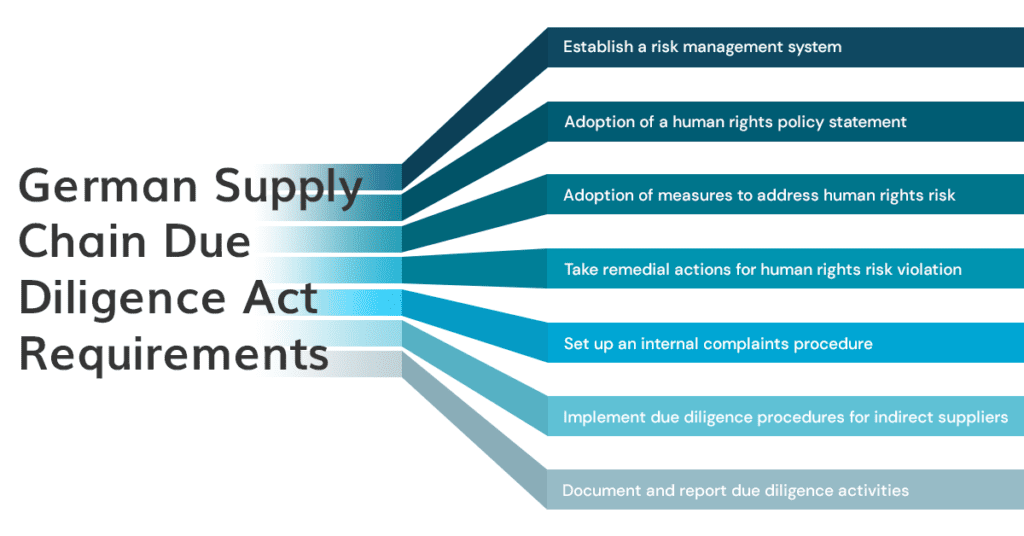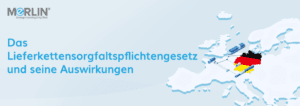The German Federal Parliament passed the German Supply Chain Due Diligence Act (Lieferkettensorgfaltspflichtengesetz, LkSG) on 11th June 2021. The act which will be effective from January 2023 aims to improve the protection of international human rights and the environment. The law obligates larger companies to conduct supply chain due diligence activities. In this blog, we will cover what ‘German Supply Chain Diligence Act is all about and what businesses need to do to be prepared.
Inhaltsverzeichnis
ToggleWhat is the German Supply Chain Due Diligence Act?
This Act sets the new standard for human rights and environmental due diligence for global supply chains. The act requires companies in Germany to comply with due diligence obligations, to ensure or improve compliance with human rights and material standards of environmental protection in supply chains, both within their direct activities and also along their entire supply chain. It also requires companies to set up grievance mechanisms ensuring reporting on an annual basis to the German government on the regulated activities.
Quick Overview of the German Supply Chain Act Scope

From When
The Act will come into force on 1 January 2023.
Applicable to Whom
In 2023, the scope of the Supply Chain Act will initially be limited to partnerships and corporations that have their headquarters, principal place of business, administrative headquarters, registered office or a domestic branch in Germany and employ more than 3,000 employees across the entire group. From 2024, the Supply Chain Act will also be applicable to smaller companies with more than 1,000 employees.
The German Supply Chain Due Diligence Act Requirements and Implications for Companies
According to the Act, companies should perform due diligence activities across their supply chain and value systems. Under the Supply Chain Act, a supply chain comprises all the steps in Germany and abroad (companies’ own business operations; direct and indirect suppliers) that are required to manufacture a company’s products and to provide its services. Financial services are also covered by the Supply Chain Act.
Hence, the obligations of the German Supply Chain Act must be fully implemented by companies in their own business operations as well as with regard to their direct suppliers. The requirements of the Supply Chain Act only extend to indirect suppliers if a company gains “substantiated knowledge” of human rights violations or environmental violations at this level.
The focal point of the new German Supply Chain Act is the obligation for companies for whom the law will be applicable to conduct human rights and environmental due diligence. The new due diligence requirements includes the following:
- Establish a risk management system.
- Adoption of a human rights policy statement.
- Adoption of measures to address human rights risks.
- Take remedial actions for human rights risks violations.
- Set up an internal complaints procedure.
- Implement due diligence procedures regarding risks associated with indirect suppliers that will be applied when the company has substantiated knowledge of a violation.
- Document the company’s due diligence procedures, risks identified, and measures taken, and then publish a yearly report on its website, which must be free of charge and publicly available.

Consequences of Failure to Comply with the German Supply Chain Due Diligence Act
If a company fails to comply with the due diligence obligations, the Act provides for sanctions in the form of periodic penalty payments of up to EUR 50,000 in administrative enforcement proceedings and/or fines. The fines can amount to up to EUR 8 million. If the company has an annual revenue of more than EUR 400 million, the fine can go up to 2% of a company’s average annual global turnover. The amount of the fine may be determined by the significance of the violation, the economic circumstances of the company and the circumstances that militate in favor of and against the company. Companies failing to comply may also be excluded from public contracts for up to three years.
Next steps to Become Compliant
In general, to become compliant with the Act, organizations should develop and implement an ESG compliance policy that specifically addresses the relevant compliance risks in their supply chain.
Hence, the first step is that companies have to analyze and assess risks within their supply chains to be able to take appropriate measures to manage these risks. The German Supply Chain Act identifies the following Environmental, Social, and Governance (ESG) criteria as relevant risk areas:
- Child labor
- Forced labor
- Occupational health and safety
- Unethical employment
- Unsafe working conditions
- Versammlungsfreiheit
- Discrimination
- Minimum wage
- Unlawful seizure of land and waters
- Environmental damage
Organizations have to map all their direct suppliers to conduct a basic risk assessment.
The risk assessment should be followed by introducing risk management systems with the processes and responsibilities to be defined and then developing and implementing an action plan to prevent/remedy risks and violations. It is also important to review, update and improve the risk assessment and the processes launched regularly.

Using Supplier Management Solutions to manage supply base, manage supplier data, collect and process information about suppliers can help assess risks, analyze them and manage them with ongoing compliance programs.
MeRLIN’s supply chain due diligence act solution enables you to integrate responsible sourcing practices across the supplier ecosystem for ensuring compliance with the Supply Chain Due Diligence Act. It comes with comprehensive features such as ability to issue policy statements, conduct supplier surveys, maintain a risk register, facilitate in-person audits, custom reports for LkSG compliance and more allowing businesses to meet the obligations of the act easily.
To know more about how MeRLIN LkSG solution can help you become compliant, contact us at info@merlinsourcing.com now.





